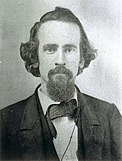Portal:Writing/Selected biography/4
Henry George (September 2, 1839 – October 29, 1897) was an American writer, politician and political economist, who was the most influential proponent of the land value tax, also known as the "single tax" on land. He inspired the economic philosophy known as Georgism, whose main tenet is that people should own what they create, but that everything found in nature, most importantly land, belongs equally to all humanity. His most famous work, Progress and Poverty (1879), is a treatise on inequality, the cyclic nature of industrial economies, and the use of the land value tax as a possible remedy.
Henry George is best known for his argument that the economic rent of land should be shared by society rather than being owned privately. The clearest statement of this view is found in Progress and Poverty: "We must make land common property." By taxing land values, society could recapture the value of its common inheritance, and eliminate the need for taxes on productive activity. (Full article...)

